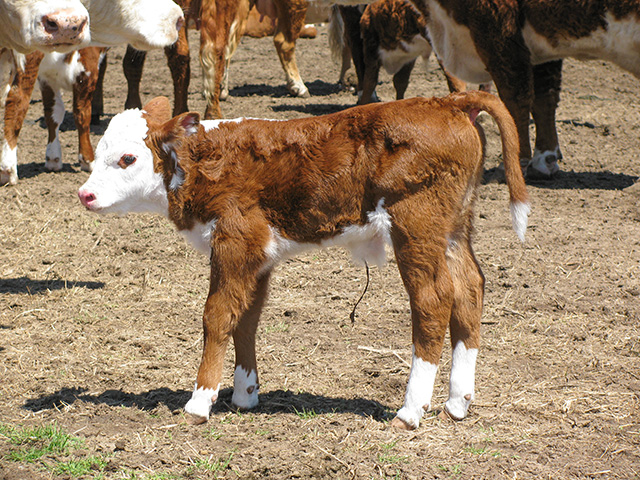Calving Season Tips
Quality Colostrum Early Keeps Calves Headed in the Right Direction
As calving season ramps up across much of the country, it's easy to forget how delicate the balance is during those first hours after birth. Calves are born with almost no antibodies, and they are only able to absorb protection through the dam's colostrum for about 24 hours. That 24 hours can never be reset, making colostrum critical to not only the calf, but to an operation's profits.
A study at the U.S. Meat Animal Research Center, Clay Center, Nebraska, looked at how calf health and productivity were tied to a newborn's passive immune status from colostrum. Looking at 263 cross-bred calves, researchers collected blood samples 24 hours post-calving to look at levels of maternal immunity the calves had attained. They were labeled as having adequate, or inadequate, immunity, and their health and performance were tracked birth to weaning, and then weaning to feedlot.
Here's what that study showed. Calves with inadequate passive immunity were at 5.4 times greater risk for death prior to weaning; at 6.4 times greater risk for sickness in the first 28 days; and saw an average of a 35-pound loss in weaning weight. Between weaning and the feedlot, those calves were at three times greater risk for health challenges.
P[L1] D[0x0] M[300x250] OOP[F] ADUNIT[] T[]
Troy Walz, beef systems Extension educator with Nebraska Extension, says calves need about 2 quarts of colostrum (about 5% of their body weight) within 4 hours of birth and another gallon within the next 12 hours. But, as any cattle producer knows, what should happen and what does happen isn't always the same thing. There are a lot of reasons a newborn calf doesn't get the needed colostrum. Some of the more common reasons include poor mothering by a dam that won't let her calf nurse, low-quality colostrum, poor udder conformation, weather conditions that make a calf sluggish to nurse, dystocia, and injuries following labor. When any of these things happens, it's time to give Mother Nature a little help.
Sometimes the best help starts with the dam, prior to calving. Peggy Thompson, veterinarian with Boehringer Ingelheim, explains if a cow is in poor body condition, her body will use any nutrition for her before making colostrum. Thompson recommends working with a nutritionist to be sure pregnant cows are getting what they need in their diets prior to calving season. In addition, she says vaccinating or giving cows boosters prior to calving helps ensure plenty of antibodies make their way into the colostrum.
Thompson recommends administering vaccines about five months prior to calving as part of pregnancy checks but no later than two months prior to calving to be sure there is enough time for antibodies to pass into colostrum. She adds that killed vaccines are especially efficient at encouraging antibody production.
It's also important to be sure cows are calving in clean areas, adds Thompson. "If you're calving into a muddy mess, then it doesn't matter how many antibodies that calf gets from its mom. The infectious agents in that mud can overcome a calf's immunity. Nothing replaces good management practices."
Veterinarian Arnold Nagely, founder and CEO of Valley Vet Supply, says cow-calf producers know they need to have colostrum on hand during calving season for just these instances. All colostrum is not created equal, however.
Natural colostrum from the operation's own healthy cows is ideal because those cows were exposed to the same pathogens and have built up immunity to those pathogens, Nagely explains. It's also good to have some alternative sources handy, and here he notes it's important producers differentiate between colostrum replacers and colostrum supplements. As the name indicates, a replacer can replace a cow's colostrum, while a supplement is more to help in cases where colostrum quality is suspect. He recommends keeping a thermos of hot water and a few bags of high-quality replacer at hand during calving season. This is especially important during cold months.
"Colostrum will help young calves defend themselves from cold weather stressors like hypothermia," Nagely says. "For the best defense against cold weather, it's beneficial for cattle producers to have colostrum replacers and supplements, calf coats and calf warming huts available if ever needed during calving."
BI's Thompson adds it's a good indicator calves aren't receiving adequate colostrum, in terms of quality and/or quantity, when they begin showing signs of scours or pneumonia anywhere from 24 hours to 3 weeks of age. This can be verified by checking the calf's immunity with a blood test, ideally done within the first few days of the calf's life. Recently, she notes, more veterinarians have begun to use tests that measure actual antibodies calves receive from their dams, called immunoglobulins. These tests are more expensive than traditional tests, but they are also more accurate.
(c) Copyright 2021 DTN, LLC. All rights reserved.






